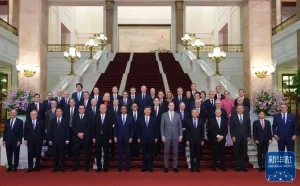Scientists Are Leaving the US and Heading Back to China
On August 27th, the 44-year-old “China-U.S. Science and Technology Cooperation Agreement” is set to expire, and the effort to renew this agreement is facing an uphill battle in the U.S. Congress.

The “China-U.S. Science and Technology Cooperation Agreement” establishes an equal cooperative relationship that has brought benefits to both China, the United States, and the world. In fact, this agreement is not so much about the so-called sensitive technologies, but primarily encompasses foundational research, including areas such as environmental science, agricultural science, physics, and chemistry.
Cooperation in scientific research is the latest casualty of the deteriorating relation between the world’s top 2 powerhouses of science. The fate of this longstanding mutually beneficial agreement has worried many in the US. The Wall Street Journal has voiced its concern, suggesting that the US is turning away from its biggest scientific partner at a precarious time, and warned that cutting research ties with China would threaten American progress in critical areas.
Each with their own agenda in mind, those in the Capitol are unlikely to heed the call, however. What they don’t realize is that these hurdles might unintentionally help cure the perennial problem of brain-drain for China, and even reverse the tide. The strained political climate already takes a toll on researchers who have built their career in the US, presenting them with tough choice to make. Some have made up their mind.
Recently, Guan Kunliang, a renowned biochemist and former distinguished professor at the University of California, San Diego (UCSD), made headlines by announcing his decision to return to China to join Zhejiang University. He is not alone in this choice, as many other top scientists have also chosen to leave the United States and go back to China, including Zhu Songchun, a computer scientist from the University of California, Los Angeles, and Xie Xiaoliang, former Harvard professor and biophysical chemist.
As China-US relations become increasingly tense and the US expands extra scrutiny of Chinese researchers, the number of overseas Chinese scientists choosing to leave the United States has surged dramatically in the last decade or so.
According to a report last month in the Proceedings of the National Academy of Sciences (PNAS), the number of Chinese scientists leaving the US for China or elsewhere increased from 900 in 2010 to 2,621 in 2021. Among them, the rate of return accelerated between 2018 and 2021.
Citing data collected by researchers from Princeton University, Harvard University and the Massachusetts Institute of Technology, the Wall Street Journal reported that in 2021 alone, more than 1,400 Chinese scientists gave up academic or corporate posts in the United States, with many even abandoning tenured positions to return home, marking a 22% increase over the previous year.
Although this number accounts for only a small fraction of Chinese scientists in the United States, the rapid overall growth in data still reflects growing concerns among researchers. Many are concerned about the wide scope of suspicions in today’s tense political climate.
An important catalyst of the return of Chinese scientists was the “China Initiative” launched by the Trump administration in academia in 2018.
During the initiative, the FBI started a new case on so-called “counterintelligence case” every 10 hours. A large number of Chinese scientists, university professors, corporate executives and other technical talents were investigated as criminal suspects.
Although the Biden stopped it after taking office, 和 has significantly stepped up the technology war and technology blockade against China. Recently he introduced new laws limiting investment in China. This makes things even harder for Chinese researchers.
In the PNAS survey, more than one-third of Chinese scientists felt unwelcome in the United States, 72% felt “unsafe” as academic researchers, about 70% were “fearful” of US government investigations into researchers of Chinese descent, and 61% admitted having considered opportunities outside the United States. The report described this as “general feelings of fear and anxiety among scientists of Chinese descent in the United States.”
Even Americans themselves believe that in the long run, the sustained loss of talent could have a major detrimental impact on US scientific research.
“This will be absolutely devastating,” said David Bier, deputy director of immigration studies at the American think tank Cato Institute. “So many of the researchers that the US relies on in the advanced technology field are from China, and this phenomenon is certainly going to negatively impact US firms and US research going forward.”
The United States and China are each other’s number one partners in scientific research, and collaborative research between the two countries has consistently ranked among the most cited papers in all fields. In some strategic areas, the US relies more heavily on China than China relies on the US (nanotechnology, telecommunications). But data shows that cooperative output between them has fallen by 15% since 2020.

At the same time, China has seen significant growth in global scientific research. The Nature Index, a reputable indicator of scientific research output, confirms China’s growing dominance. Between 2015 and 2021, China’s contribution to the Nature Index continued to rise. By 2022, it had surpassed the United States for first place. All of the top 10 institutions in the Nature Index that increased their share of natural sciences came from China, led by the Chinese Academy of Sciences.
At the same time, China keeps recruiting overseas talent. It is also increasing investment in research and development. This is speeding up progress in emerging technologies such as new energy, artificial intelligence, biotechnology and quantum.
Patterns of international cooperation are changing. A major shift also happening in China’s scientific world. It remains to be seen how these changes will impact global research partnerships and innovation going forward.
But for now, what we are sure is that Chinese scientists leaving the United States is bad news for Washington. The US, having itself benefited enormously from the exodus of scientists from Europe a century ago, should understand this better than any other country in the world.
Editor: zhaozhizhao



